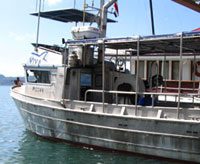February 13, 2005
The Ranger approaches.
 Xavier has been in touch with the Ranger crew; they are nearby and should arrive in Golfito tonight.
Xavier has been in touch with the Ranger crew; they are nearby and should arrive in Golfito tonight.
We have been working closely with the staff of MarViva to prepare for the trip to Cocos Island. Some background on MarViva: The organization was created in 2002 to enforce protection in the Eastern Tropical Pacific Marine Conservation Corridor (a string of five islands that includes Cocos, off Costa Rica; Coiba, off Panama; Malpelo and Gorgona islands, of Columbia; and the famous Galapagos of Ecuador) and throughout the Meso-American reef system, which runs from the Caribbean coast of Mexico to Honduras. Both areas are extraordinary. The islands that make up the Marine Conservation Corridor, on the Pacific side, all belong to the same geologic formation — a ring of heightened seafloor that looks like a mountain ring on a topographical map. Because of the magnetic peculiarities of the area and the many currents that converge here, the corridor is a destination — and now a haven — for migratory species like sharks (silky, scalloped hammerhead, Galapagos and whitetip, among others), billfish (swordfish, marlin, sailfish), tuna, endangered sea turtles (leatherback, east Pacific green, olive ridley, loggerhead) and endangered great whales (blue and humpback). The coral reefs by some of the corridor’s islands are among the few in the Eastern Tropical Pacific.
Sharks are not the only predator species drawn to the corridor’s wealth. Illegal fishing — particularly shark finning — is a threat of increasing proportions to the corridor’s marine life. Local fishermen (Costa-Rican flagged boats) do most of the longlining, but it is much larger boats, many from Taiwan, PoC, that collect the fins at sea or at port and carry them back to Asia, where a heady market for shark fins — a fin is practically worth its weight in gold — drives the trade. According to the MarViva staff, boats fishing illegally around here also tend to have high rates of bycatch of dolphins, sea turtles and various other threatened species.
As far as I know, MarViva is entirely unique in its activities and approach: the organization has an agreement with the Costa Rican government whereby the MarViva fleet carries official park rangers on patrol routes around Cocos and Coiba islands. The fleet is comprised of three salmon-fishing boats that Xavier’s team brought down from Seattle back in ’02; with their reflective aluminum hulls and flat snouts, designed for gillnetting in Alaska, the “Bristol Bay” boats look as natural plying Costa Rica’s tropical waters as polar bears in the jungle, but they do the job — and a good job. MarViva has only been in action two years, but already the group’s efforts seem to have made a huge difference. Michelle Soto, a journalist with MarViva, says the change is visible:
“After just two years of work, we don’t see any more ‘bloody Octobers.'” October, because of the influx of migratory species to Cocos in the fall, used to open an annual illegal fishing bonanza. “Now, with MarViva and the park rangers, there are no fishing boats in the islands. Before 2002, you could see 30 fishing boats at a time. Now the only boats you see are MarViva boats, coast guard boats, and a few tourist boats.” There are three scuba diving boats licensed to run trips to Cocos. MarViva collaborates with them as well.
She also says that word of the shark finning problem is spreading.
“Now you can hear in a bus people talking about shark finning. One day a little kid called me and said, ‘I have to do a homework about shark finning. Can you give me some information?’ People are starting to know the problem.”
A day spent in the MarViva office is enough to impress. The building is a big breezy house, an old banana company building that the MarViva team rescued from oblivion and restored to its original condition. Inside there are dark, shiny wood floors, fans spinning overhead, and MarViva staff in blue T-shirts radioing to the fleet at sea and calling back and forth with the San Jose staff, who are currently sponsoring a multinational conference on proposals to curb shark finning throughout Central American waters. For Xavier this is a homecoming of sorts; for me it’s a chance to see the workings of an innovative conservation project in an unfamiliar setting; and I think that everyone is glad to be part of a very promising Oceana/MarViva partnership.

